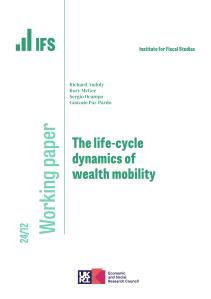Wealth and mortality at older ages: a prospective cohort study
- Jane P. Biddulph
- Martin Bobak
- Panayotes Demakakos
- Michael Marmot
Published on 13 May 2016
BACKGROUND: Despite the importance of socioeconomic position for survival, total wealth, which is a measure of accumulation of assets over the life course, has been underinvestigated as a predictor of mortality. We investigated the association between total wealth and mortality at older ages.
METHODS:
We estimated Cox proportional hazards models using a sample of 10 305 community-dwelling individuals aged ≥50 years from the English Longitudinal Study of Ageing.
RESULTS:
2401 deaths were observed over a mean follow-up of 9.4 years. Among participants aged 50-64 years, the fully adjusted HRs for mortality were 1.21 (95% CI 0.92 to 1.59) and 1.77 (1.35 to 2.33) for those in the intermediate and lowest wealth tertiles, respectively, compared with those in the highest wealth tertile. The respective HRs were 2.54 (1.27 to 5.09) and 3.73 (1.86 to 7.45) for cardiovascular mortality and 1.36 (0.76 to 2.42) and 2.53 (1.45 to 4.41) for other non-cancer mortality. Wealth was not associated with cancer mortality in the fully adjusted model. Similar but less strong associations were observed among participants aged ≥65 years. The use of repeated measurements of wealth and covariates brought about only minor changes, except for the association between wealth and cardiovascular mortality, which became less strong in the younger participants. Wealth explained the associations between paternal occupation at age 14 years, education, occupational class, and income and mortality.
CONCLUSIONS:
There are persisting wealth inequalities in mortality at older ages, which only partially are explained by established risk factors. Wealth appears to be more strongly associated with mortality than other socioeconomic position measures.








